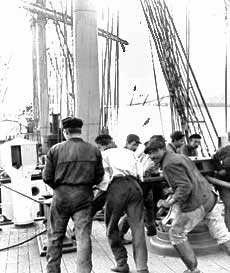Aubrey Ernst
4/16/07
Billy Bud, Sailor
Working the Waters
During this quarter we have read two books on the lives of sailors and in both books it is obviously stated that most officers and masters are of a morally erroneous nature. In the book Billy Budd, Sailor by Herman Melville, Captain Vere was a just and fair man. “He had seen much service, been in various engagements, always acquitting himself as an officer mindful of his men, but never tolerating an infraction of discipline…” pg 26, Melville. These were unique characteristics to find in a Captain in that time period. Why was it so rare to find a captain or officers that were just and treated their crew in a reasonable manner?
Because of the isolation form land and from the courts, officers and captains were able to harshly punish their crewmen and use fear tactics to keep the crew under control. There were many tasks involved in a life at sea that were considered by most to be immoral. The authorities of the ships would over punish and sometimes even kill men in order to scare the remaining crew into obedience and compliance. “when Billy saw the culprit’s naked back under the scourge, gridironed with red welts and worse, when he marked the dire expression in the liberated man’s face as with his woolen shirt flung over him by the executioner he rushed forward from the spot to burry himself in the crowd, Billy was horrified. “ pg 39, Melville.
To shorten rations and give less pay increased profits for the captains and the merchants who controlled them. This would easily caused unrest among the common sailor because some Captains would make the crew pay for essentials causing them to lose all their money before making landfall. It also caused sickness and malnutrition. “… there was a direct relationship between the amount and quality of victuals given to the crew and the overall profitability of the voyage. This part of the wage relation sometimes pitted profits against human life.” Pg 126, Rediker. Another tactic that was used to save money and to ensure that men would not desert the ship was holding pay. There was little that a seaman could do to get his allotted money, the courts found an easier time siding with the merchants rather than the common sailor.
Seamen were in truth an expendable commodity to the business of world trade. They were generally easily replaced and some were indentured workers who gained nothing and were working off their debt. Sailors were abused because of these facts. Why not abuse them when there were few repercussions and it was easy to find another to take their place? “This…resulted in many disabling injuries inflicted by masters and mates upon the common men of the deep.” Pg 93, Rediker. Many a man died because of this manipulation of the overpopulation that needed work in the times following mass dispossession of people from the lands they worked.
Conclusion. I need some help with my concluding statement, I’m having trouble coming up with a few sentences that wrap up the whole thought of the paper.
Another quote I would like to use.
“yet for all these men, self-protection- from harsh conditions, excessive work, and oppressive authority- was necessary to survival” pg 110 rediker
